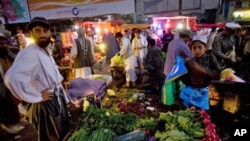A secure, stable and prosperous Afghanistan will help ensure a secure, stable and prosperous region. "All of Afghanistan’s neighbors and near-neighbors stand to benefit from an end to the insurgency, a political solution, and a transition to a sustainable economy in Afghanistan," said State Department Assistant Secretary for the Bureau of South and Central Asian Affairs Robert Blake. That is where the New Silk Road vision comes in.
For centuries, Afghanistan had been an important part of the Silk Road, a network of ancient trade routes that connected Asia with the Mediterranean and Europe, as well as parts of North and East Africa. Taking its cue from history, the New Silk Road envisions a network of economic, transit, trade, and people-to-people connections across South and Central Asia that will embed Afghanistan more firmly into its neighborhood. As Assistant Secretary Blake said: "If Afghanistan is firmly integrated into the economic life of the region, it will be better able to attract private investment, continue to develop and benefit from its vast mineral resources, and provide increasing economic opportunity for its people, men and women alike."
The private sector is critically important to this endeavor. Raw materials from one area could be sent down the road where they would be processed, and then passed on to distribution hubs and ports and shipped to markets all over the world.
"It will take a concerted effort from the Afghans, regional partners and the international community to put past rivalries behind them and seize the enormous opportunity afforded by greater integration to bring many of these plans to fruition," said Assistant Secretary Blake. "I am hopeful that Afghan integration into the greater region, and the region’s integration with the global economy, will yield tremendous benefits for the people of the region," he said.
"As linkages are created across borders and trade from north to south and east to west increases, a rising tide of economic growth can lift all countries of the region."
The New Silk Road envisions a network of economic, transit, trade, and people-to-people connections across South and Central Asia that will embed Afghanistan more firmly into its neighborhood.




